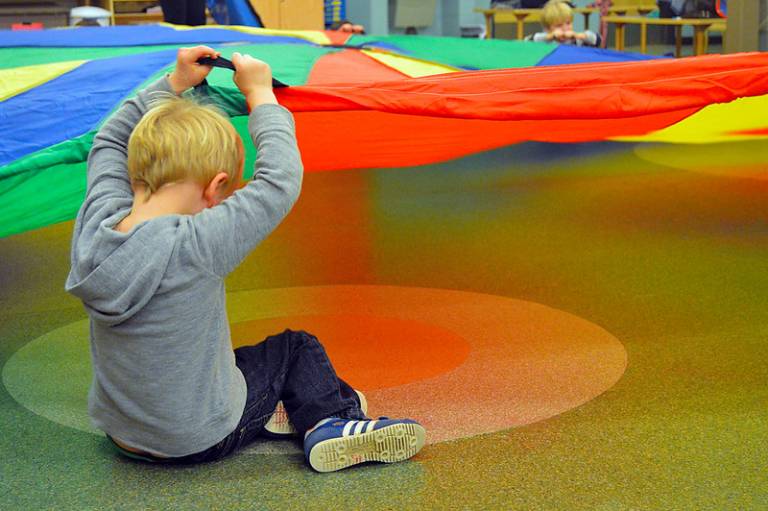Sure Start delivered major health benefits for children in poorer neighbourhoods
4 June 2019
The Sure Start programme has had a positive effect on children’s health, particularly those living in disadvantaged areas, according to a new report led by UCL and the Institute for Fiscal Studies (IFS).

The report titled ‘The health effects of Sure Start’, funded by the Nuffield Foundation, is the first of its kind to evaluate the overall impact of the programme in England, between its inception in 1999 and its peak in the late 2000s.
Dr Gabriella Conti (Associate Professor of Economics at UCL and IFS Research Fellow), who led the study, said: “Access to Sure Start has had big benefits for children’s health during primary school. Relative to not having Sure Start, opening one centre for every thousand children prevents 5,500 hospital admissions of 11-year-olds each year. Since the benefits are biggest in the poorest neighbourhoods, access to Sure Start can help close around half the gap in hospitalisations between rich and poor areas.”
Sure Start is a Government funded programme that supports parents with children under five years old. First established 20 years ago, Sure Start provides a wide-range of education, health and childcare services designed to support children’s health and well-being, with the aim of 'giving children the best possible start in life.'
At its peak in 2009-2010 Sure Start accounted for £1.8 billion of public spending (in today’s prices). However, in the decade since, spending has been cut by two thirds and more than 500 centres have been closed.
Despite its rapid expansion and the subsequent cuts, evidence on the impact Sure Start has had on the health of children and their families has been relatively scarce.
The key report findings include:
- Sure Start significantly reduced hospitalisations among children by the time they finish primary school. These effects build over time: while there is no significant effect at age 5, by age 11 greater Sure Start coverage (one more centre per thousand children aged 0–4) prevents around 5,500 hospitalisations per year.
- Sure Start’s benefits are strongest for children living in disadvantaged areas. There is no effect on the hospitalisations of children living in the richest 30% of neighbourhoods. This means that providing access to Sure Start at the level of the programme’s peak closes about a half of the gap in hospitalisation rates between the 30% poorest and 30% richest areas by the end of primary school.
- At every age in primary school, Sure Start reduced hospital admissions for injuries. At younger ages, injury-related hospitalisations fell by around 17% of their pre-Sure-Start baseline; at ages 10 and 11, they fell by 30%.
- The results are robust and hold up against a variety of checks. The findings account for differences between neighbourhoods and nationwide differences across years. As expected, we find no impact of placebo treatments or on outcomes that Sure Start can’t influence (such as genetic defects).
- The direct savings to the NHS from fewer hospitalisations at ages 5–11 amount to about £5 million per cohort, or just 0.4% of average annual spending on Sure Start. Including the longer-run savings from fewer injuries as well, the financial benefits reach around 6% of Sure Start’s budget.
- Between 2011 and 2017, over 500 Sure Start sites have officially been closed. While closures have been concentrated in richer areas, about 170 of those closures have been in the poorest 30% of neighbourhoods. There has been a lot of variation between councils. Some local authorities have closed the majority of their centres, while others have chosen to keep centres open but reduce the services on offer.
With the governments’ newly commissioned work on early years’ services, as well as the upcoming Spending Review, this report comes at a crucial time in determining the future of the Sure Start programme.
The research provides strong evidence that the Sure Start model has worked better in poorer neighbourhoods, reducing health inequalities. Unpicking to what extent this is driven by choices individual centres make, or the characteristics of the families they serve, should be a top priority for future research into Sure Start.
IFS Research Economist Christine Farquharson said: “Sure Start has had a turbulent history, with a fast roll-out followed by deep spending cuts. But these decisions were not always based on thorough evidence about the programme’s impacts on children and their families. Ahead of the Spending Review, it’s crucial that both central government and local authorities use the best evidence available to decide on their vision for Sure Start as the programme turns 20. Our findings suggest that limited resources are best focused on the poorest areas.”
Links
Image
- Credit: Emily Matthews via Flickr
Media contact
Natasha Downes
tel: +44 20 3108 3844
E: n.downes [at] ucl.ac.uk
 Close
Close

